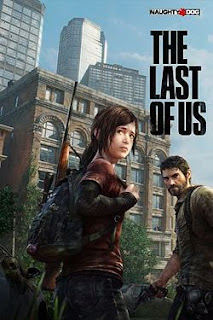One of the most applauded and original titles to come out of this year's e3 is the Action/Adventure/Survival game
The Last of Us, about a "ruthless survivor" and his daughter navigating a post-apocalyptic world filled with fungus spore-infected humans and other uninfected people. The game -- made by Naughty Dog -- has, to this point, writing, environment, and characters all hitting those cinematic notes seen in hit pedigree games like
Uncharted and
Max Payne 3.
In
an e3 presentation, we follow Joel and Ellie from inside a cafe, into flooded streets, and up onto the upper levels of a former hotel, before the duo begins ducking for cover behind a bunch of overturned furniture and around corners to sneak past fellow uninfected survivors. The Joel mucks the whole thing up and starts shooting from behind cover.
I say "mucks the whole thing up" in the same broad comparison to
Max Payne 3 and
Uncharted because the three are massively cinematic, story-driven experiences of characters moving down a linear, if not entirely always clear to the viewer, path. And this strong, well-set, well-developed narrative is disjointed by periodic combat sections that break up a flowing story to fire pot shots at bad guys from around corners and behind window sills.
I say this mucks it up because this is your only route down the linear path. There's nothing wrong with making huge explosions, mowing through small cities of nameless grunts, or conserving health by using overturned tables and chest-high walls. My issue is that, as a medium, gamers have been able to do that and more, and they've been able to do it for some time. It's for this reason, I feel as though the cover-based action-adventure and/or -survival archetype should blatantly steal from one of my video game heroes, Hideo Kojima.
I've made it no small point of public record that I'm a
Metal Gear fanboy, but don't click away just yet! Love or hate
Metal Gear's sometimes inedible plot, the series has always been about linear cinematic storytelling with many avenues to a single conclusion. The highest "ranks" in the series are issued to players that make it through the game with the fastest time and the lowest number, if any, kills. Combat is broadly discouraged; making noise and alerting enemies is often fatal; stealth is optional but generally indispensable.
When
Metal Gear Solid 4 was released, the game added cover and first-person shooter elements (expanding upon initial strings of its DNA from
Metal Gear Solid 3 and its similarly "beta"
Metal Gear Online) to supplement crawling, walking, and running as methods through your various goal points. The game was released 4 years ago, in 2008. It's 2012 and our action-adventure games only have "kill all the dudes shooting at you in this room" as a progression option.
There is no reason that intelligent stealth options -- be it complete avoidance, silent kills, rendering enemies unconscious, etc. -- can't be incorporated into these games. There's no reason we need to rely entirely on cover-based combat to make it through a story. I don't say this as someone adverse to violence -- one of my other favorite games of all time are the
Devil May Cry series -- but as someone bored with the constant hail of gunfire at an invincible point of cover, punctuated by return fire at enemies often too dense to follow suit. Variety, they say, is the spice of life, and there's a lot of excess replay time in giving players more and varied ways to save to uncover secret plots, or what have you.
And don't say AI couldn't allow it -- in both
Max Payne 3 and the demo for
The Last of Us, enemies frequently do not acknowledge the protagonist until he's entered their line of sight, fired upon them, or made some general ruckus (though some
Max Payne 3 and
Uncharted enemies suffer from omni-environmental comprehension, where stepping within a certain range in a given area automatically triggers aggression -- but this shouldn't be the case at all, if possible).
The most common complaint I've heard of
MGS4 was that it focused too much on cinematics and not enough on gameplay.
Uncharted et al have largely perfected that seamless blend of cinema with gameplay, where the two are almost entirely bundled together. Development of environment, setting, and character, technologically and through storytelling, are at the highest they've been in the history of video gaming. Game mechanics, similarly, have advanced to the point where your environment is just as much as tool in aiding your end goal as the number of rounds in your active weapon. But developers seem to be stuck behind these chest-high walls, rather than incorporating them into a greater tapestry of valid gameplay options that steer our protagonist from point A to B and all stops in between.
I absolutely love where we are in video game storytelling. It's certainly not art yet, but it's definitely at or greater than many top-grossing movies I've seen. But the industry seems too caught behind a single-minded notion that all the best combat is had leaning against and firing a gun from an environmental prop. Maybe there's more to be seen in
The Last of Us that I can speak better of, but current billing for the game says otherwise.










